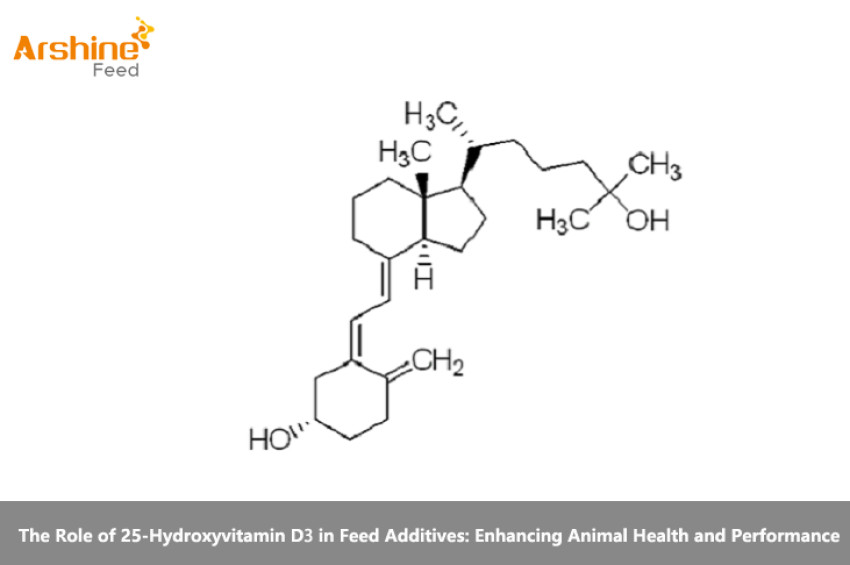
Introduction : In recent years, the importance of optimal nutrition for animal health and performance has gained significant attention. Among the essential nutrients,25-hydroxyvitamin D₃, a metabolite of vitamin D₃, has emerged as a promising feed additive. This article delves into the applications of 25-hydroxyvitamin D₃ in animal nutrition, highlighting its role in promoting bone health, immune function, and overall animal performance.
Section 1: Understanding 25-Hydroxyvitamin D₃ 25-Hydroxyvitamin D₃ is a biologically active form of vitamin D₃ that is produced through the hydroxylation of vitamin D₃ in the liver. It plays a crucial role in calcium and phosphorus homeostasis, aiding in the absorption and utilization of these minerals. While animals can synthesize vitamin D₃ through sunlight exposure, dietary supplementation of 25-hydroxyvitamin D₃ offers a convenient and effective means of ensuring optimal levels.
Section 2: Promoting Bone Health and Mineral Metabolism One of the primary benefits of 25-hydroxyvitamin D₃ in feed additives is its role in promoting bone health and mineral metabolism in animals. It enhances the absorption of calcium and phosphorus from the diet, facilitating proper bone development and maintenance. Adequate levels of 25-hydroxyvitamin D₃ in animal diets contribute to stronger bones, reduced risk of skeletal disorders, and improved overall skeletal integrity.
Section 3: Immune Function and Disease Resistance Research has demonstrated the importance of 25-hydroxyvitamin D₃ in immune function and disease resistance in animals. It plays a vital role in modulating the immune response, supporting the production and function of immune cells. Adequate levels of 25-hydroxyvitamin D₃ in animal diets have been associated with improved resistance against infectious diseases and reduced susceptibility to various pathogens. This can result in enhanced animal welfare, reduced antibiotic usage, and improved overall productivity.
Section 4: Performance Enhancement and Productivity Supplementing animal diets with 25-hydroxyvitamin D₃ has shown positive effects on animal performance and productivity. It has been linked to improved growth rates, feed efficiency, and reproductive performance in various species. 25-Hydroxyvitamin D₃ supports optimal nutrient utilization, which can translate into better weight gain, increased milk production, and improved reproductive outcomes. These performance benefits contribute to the overall profitability and sustainability of animal production systems.
Section 5: Considerations for Effective Use To harness the benefits of 25-hydroxyvitamin D₃ in feed additives, considerations for effective use must be taken into account. These include determining the appropriate dosage based on animal species, age, and production stage, as well as ensuring proper storage and handling to maintain potency. It is also important to monitor animal health, skeletal development, and production parameters to assess the efficacy of 25-hydroxyvitamin D₃ supplementation and make any necessary adjustments.
Conclusion The inclusion of 25-hydroxyvitamin D₃ in feed additives offers a valuable tool for promoting animal health, enhancing performance, and ensuring optimal nutrient utilization. Its roles in bone health, immune function, and disease resistance make it a significant component of animal nutrition strategies. By incorporating 25-hydroxyvitamin D₃ into animal diets, producers can support the well-being of their livestock, improve productivity, and contribute to sustainable and efficient animal production systems. However, it is important to work closely with nutritionists and veterinarians to develop appropriate supplementation strategies tailored to specific animal species and production objectives.
https://www.arshinefeed.com/Knowledge/Role-of-25-Hydroxyvitamin




